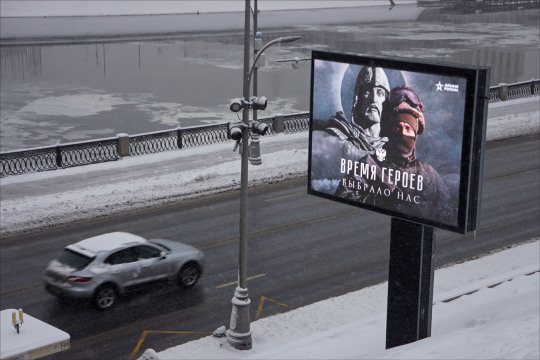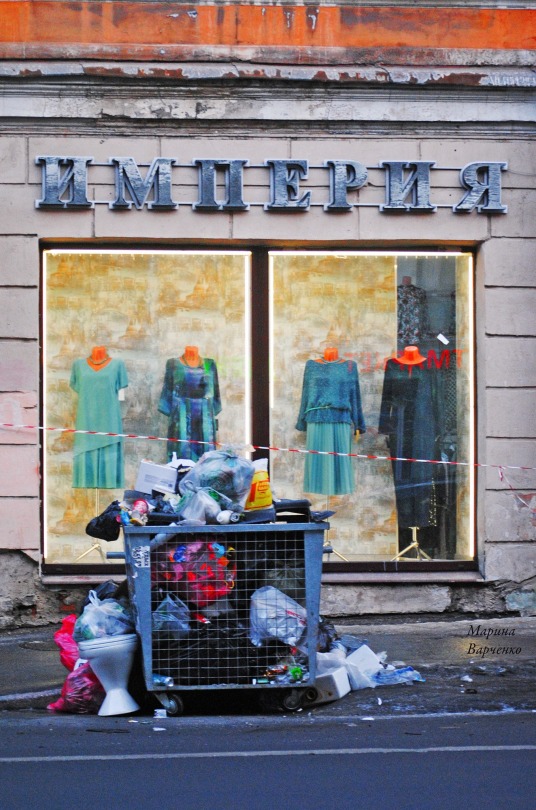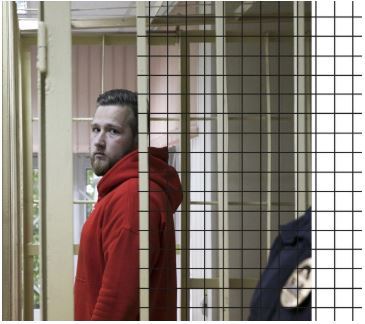#DOXA (Russian student magazine)
Explore tagged Tumblr posts
Link
https://www.ukrinform.net/rubric-society/3871583-roc-assists-in-russification-of-abducted-ukrainian-children-to-destroy-their-identity-isw.html The Russian Orthodox Church (ROC), supported by the Kremlin, is actively involved in the Russification of Ukrainian children who were illegally deported to Russia to destroy their national identity. The analysts in their report refer to a joint investigation by the Russian opposition student magazine DOXA and the open-source resource Kidmapping, which highlights the … 英语:俄罗斯东正教协助被绑架的乌克兰儿童俄罗斯化以摧毁他们的身份 Read More »
0 notes
Text
Comfortably Numb
An abundance of news — especially bad news — sometimes robs a person of empathy. They have no compassion for anyone and do not want to help. They pay no mind to important events such as the military operations in Ukraine or disasters around the world. If this happens to loved ones, they seem callous to us, as if they are hiding their heads in the sand and refusing to look at reality. But when it…

View On WordPress
#"Hunters" (TV series)#7X7 (Russian web publication)#art therapy#collective trauma#Dasha Manzhura#DOXA (Russian student magazine)#false identity#group therapy#Kit Loring#mindfulness#narrative therapy#political apathy#Rusglish#Russian invasion of Ukraine#The Order Academy Inc.#trauma narratives
1 note
·
View note
Text
While it’s too early to tell what the scale of the migration caused by Russia’s invasion of Ukraine will be when all is said and done, it’s clear that the war has sent demographic shockwaves across the region. In addition to the millions of Ukrainian refugees who have fled to the EU, more than a million others are now in Russia, many of them victims of forced deportation. Meanwhile, hundreds of thousands of Russians have left their own country, fleeing the Kremlin’s wartime crackdown on dissent and Putin’s mobilization campaign. While these crises differ in scale, one consequence they share is that children from both countries are suddenly living in environments where they stand out from their peers — a situation ripe for bullying. Journalists from the student-run online magazine Doxa spoke to Russian and Ukrainian parents now living abroad about the difficulties their children are having at school. In English, Meduza explains what they learned.
Iryna (name changed) is from a small town in Ukraine’s Donetsk region. She moved with her husband and two sons to St. Petersburg after the roof of their home was blown off by a shell. The family would have preferred to go to Europe, but Iryna's elderly parents still live in Ukraine, so she didn’t want to move too far away.
“One [of Iryna's sons] is a teenager and the other is just a baby,” Natalia, a St. Petersburg-based activist who works with Ukrainian refugees in the city, told the Russian news outlet Doxa. (Natalia spoke to journalists on Iryna's behalf; Iryna was too scared.) When the family’s home was shelled, Iryna's older son used his body to shield his little brother. Soon after, he began suffering from what sound like symptoms of trauma. “He would freeze for a few seconds at a time, he slept poorly, he cried out in his sleep, and his legs would shake,” Natalia said.
Unable to find a job that paid enough for an apartment in St. Petersburg, Iryna and her family eventually moved to a border town in the Rostov region. Still, she and Natalia stayed in touch. When she would travel to the city so Natalia could help her with document issues, she would sometimes start crying while talking about her new home. “[Iryna would say that] there are portraits of Putin and Kadyrov everywhere, the population practically pray to them, and everybody supports the war and hates Ukraine, despite the fact that practically everybody has family there,” Natalia told Doxa.
Iryna's older son enrolled in a local school, but he only went for three days. “He came home with a smashed-up face: the classmates beat him up after he told them he was Ukrainian and proud,” Natalia said. “Now the boy refuses to go to Russian school, and Iryna is afraid child protection services are going to come for him. Now the teenager is remotely attending his Ukrainian school.” The boy’s classmates are spread throughout Europe and the unoccupied part of Ukraine; he’s the only one in Russia.
Natalia told Doxa that explicit bullying of Ukrainian children in Russia is the exception rather than the rule, and other volunteers agreed. For example, Alla, a charity organization employee who lives in St. Petersburg, said that it’s easier for parents who’ve been deported to Russia from Ukraine to send their children to school than it is for migrants from Central Asia, who often face racism and hostility in Russia. This is in part because even Russians who support the war usually don’t blame Ukrainians in Russia for simply being there: “If they believe [Russian propaganda] and believe that Ukrainans are Nazis, then they think, ‘These people are running from the Nazis,' and [so] they treat the refugees alright,” she said.
Nonetheless, many Ukrainian students in regions throughout Russia have faced bullying and harassment at school this year. Lida Moniava, the founder of the Lighthouse Charity Foundation, listed examples in a recent Facebook post:
Last week, two upperclassman girls spent five hours having a ‘chat’ with the director [of the school] and representatives of [security] ‘agencies.’ Their classmates had complained about an 'anti-Russian’ post one of the girls made on social media. [In another case,] kids were shouting at an overweight [Ukrainian] boy, ‘Did you sit in a basement and starve, fatty?’ Another boy, as part of an assignment for his social studies class, was asked to 'draw the flag of any country,' and drew the Ukrainian flag. His classmates snatched the drawing from him and stomped on it. One teenage girl started coming home from school sullen and depressed at the start of the year, though she said everything was fine. Then her mom looked in her backpack and found notes with threats from her classmates because of her nationality.
‘I’m glad my daughter is here’
The Russian parents living abroad who spoke to Doxa described a strikingly different situation. Initially, they said, their new acquaintances and colleagues asked how they could help their new guests; a few people were even given time off work. While some inevitably felt tension surrounding the topic of the war, nobody described experiencing as much as incivility from their new hosts.
Lidia, a Russian woman living in Tbilisi, said that there are six Russian-speaking children in her daughter’s class, not including her daughter. “One day, when they were talking to one another in Russian, the teacher came to them and asked them not to speak in the language of occupiers, even among themselves,” she told Doxa. “But none of the six children is even Russian. One of them, for example, is from Kazakhstan.” Overall, though, Lidia said that both the students and the teaching staff at her daughter’s school in Tbilisi are “so much less toxic than in Russia,” adding, “I’m really glad my daughter is here.”
Veronika, a Ukrainian woman who lives in Germany, has tried to take a more active role in her daughter’s school situation. “I don’t let my child be friends with Russian children. I develop an unfriendly attitude towards everything that comes from Rashka,” she told Doxa. Regardless of what their parents might tell them, however, Veronika's daughter and the Russian students in her class talk to each other — though “when parents come around, they separate,” said Veronika. “[One of the Russian girls,] of course, told her parents [that I forbid my daughter from talking to her]. But there was no conflict between us — maybe the parents [...] have decided it’s better not to react.”
2 notes
·
View notes
Text
How to dodge media censorship in Russia: Leave and use Telegram
Following Russia’s invasion of Urkaine and a crackdown on the media, independent outlet DOXA – like others – had to reinvent itself.

More than 100 people gathered outside of the Dorogomilovsky district court in Moscow on the foggy morning of April 12. Inside the court, four DOXA magazine journalists were about to hear their sentence in a year-long criminal case. They were accused of encouraging minors to protest in a YouTube video they published in the midst of pro-Navalny rallies in January 2021. As hours passed, the crowd and the police presence grew. A woman with balloons in Ukrainian flag colours and six more people were arrested by the police. Tension rose. Finally, at 5:00pm the judge announced the sentence – two years of “correctional labour”.
In different circumstances and in a different country, such an outcome might have depressed the defendants. But the journalists were relieved. The measure obligates the four – Alla Gutnikova, Armen Aramyan, Natalia Tyshkevich, and Vladimir Metelkin – to work in Russia and give five to 20 percent of their earnings to the government.
It could have been worse – a two-year jail term. The four had already spent a year under house arrest, and this latest sentence meant freedom: their tracking anklets would be removed immediately, they would be able to leave their houses at any time and use the internet again.
The crowd cheered as three of the four journalists left the court. Tyshkevich was taken to jail where she was serving a 15-day sentence in another case, for a 2017 Instagram post with a Ukrainian coat of arms.
‘New level of danger’
Today, more than two months into Russia’s invasion of Ukraine, almost all of DOXA’s 20 journalists have either left Russia or stopped reporting. So have more than 150 Moscow-based reporters and editors of Meduza, BBC Russian, Dozhd television, Ekho Moskvy radio station, Novaya Gazeta, the Moscow Times and other independent media.
DOXA’s editors felt they had no other choice. “Otherwise, we couldn’t guarantee their safety,” said one DOXA editor who uses the pseudonym Richard Kropotkin. “This was a test for our editorial team, because some people, the majority, felt that this was а new level of danger.”
In early March the Russian government introduced a law punishing “fakes about the Russian army” with up to 15 years in prison. “Fakes” included citing Ukrainian sources and using the word “war” instead of the government-approved “special operation”.
“We had a long discussion with the editorial team, and we concluded that we can’t self-censor,” said a DOXA editor, Katya Moroko, over a video call from Germany. “Any small step towards compromising with this government meant that they would ‘tighten the screws’ even more, and this compromise wouldn’t save us.”
After four days of almost non-stop coverage of the war, the DOXA website was blocked by the Russian government regulator Roskomnadzor, after a post about how to talk with friends and relatives who support the Russian invasion went viral on social media. In the following days, two dozen other independent Russian media were blocked or taken off air. “Those [first] days were really terrible,” said Masha Menshikova, DOXA’s news editor who is currently based in Germany. “I just sat at the computer from morning to night … Everything has changed for us because we have never written about the war in such detail. We wrote about universities.”
Popularity among students
DOXA started as a student magazine at the Higher School of Economics (HSE), one of Moscow’s most prestigious and most liberal universities. It quickly became one of Russia’s biggest media outlets covering education. In the summer of 2019, high school and university students in Moscow took to the streets when several opposition candidates were not allowed to run in the city council election. DOXA actively covered the rallies and asked inconvenient questions about the election campaign of HSE vice-rector Valeria Kassamara. In opinion pieces and social media posts, the magazine supported students who were arrested. As a result, the HSE discontinued the magazine’s registration as a student organisation, stating that the university is “beyond politics”. This, however, only contributed to DOXA’s popularity.
0 notes
Photo

Из-за войны с Украиной российские власти за шесть дней заблокировали ряд независимых СМИ: радиостанцию «Эхо Москвы», телеканалы «Дождь» «Настоящее время», журнал The New Times, студенческое издание Doxa, региональные издания «Тайга.Инфо» и «Крым.Реалии». «Медуза» остается одним из самых честных независимых русскоязычных изданий называющих войну войной. Помочь «Медузе» значит помочь тысячам, а может и миллионам россиянам понять лож и лицемерие официальной пропаганды. Сказать нет войне.
Due to the war with Ukraine, the Russian authorities blocked a number of independent media in six days: the “Ekho Moskvy” radio station, the TV channels “Dozhd” and “Nastoyashee vremya”, “The New Times” magazine, the student media “Doxa”, the regional media “Taiga.Info” and “Krym .Realities”. “Meduza” remains one of the most honest independent Russian-language publications in calling war a WAR. Helping “Meduza” means helping thousands, if not millions, of Russians understand the lies of official propaganda. Say no to war.
0 notes
Text
Russian’s Banned Youth | Close Up | Protests
Russian’s Banned Youth | Close Up | Protests
From: Al Jazeera Close Up Editors of the online student magazine ‘DOXA’ are currently under house arrest for criticising the Russian government. After Kremlin critic Alexey Navalny was arrested at a Moscow airport in January 2021, hundreds of thousands of people took to the streets in more than 60 cities to protest against his detention. Many of them were students. Thousands were detained by the…

View On WordPress
0 notes
Link
Russian magazine DOXA raided, journalists charged by authorities The homes of four editors and some of their family members were searched, DOXA said in an official statement published on their website. According to DOXA, phones and laptops were seized during the searches and journalists Armen Aramyan, Alla Gutnikova, Vladimir Metelkin and Natalia Tyshkevich were taken by the Russian Investigative Committee for questioning. All four journalists have now been charged for inciting minors to protest, said DOXA, which also rejected the allegation. “There were no calls to illegal actions in our video — we said that young people should not be afraid to express their opinions,” DOXA’s statement read. Agora, the legal organization representing the four journalists, referred CNN to DOXA’s statement. The Investigative Committee did not respond to CNN’s request for comment. The four will be under strict pre-trial communications restrictions until June 14, according to a statement by Moscow’s Basmanny court. According to DOXA, the restrictions include a prohibition on leaving their homes between midnight and 11:59 p.m, using the internet, and communicating with anyone other than with their lawyers and close relatives. DOXA magazine started as a small online publication run mostly by students at the Higher School of Economics in Moscow. It has since grown and become independent. The magazine said raids were in connection to a video taken earlier this year in which the magazine’s editors explained to students that it was illegal for them to be expelled from university for participating in protest actions in support of Alexey Navalny. The video was removed from the DOXA YouTube channel following a request from Russia’s media regulator Roskomnadzor in late January, just a a few days after it was originally posted. The watchdog argued the video encouraged participation in unauthorized protests — a claim that DOXA disputes. “The pressure that the journalistic community has faced lately is unprecedented, but we will not stop our activities. We will continue to highlight what is important to young people and continue to advocate for their rights,” DOXA said in the statement. A ‘new low’ for press freedom Amnesty International has called the raids “a new low” for press freedom in Russia. Russian authorities have cracked down on protesters showing support for Navalny, and hundreds of people were detained during protests in recent months. Russia has also vowed to act against social media platforms that do not take down posts which the Kremlin deemed as illegal or as inciting people to take party in “unauthorized protests.” Last Friday, independent Russian investigative media outlet IStories said that the Russian intelligence agency FSB raided its offices, as well as the home of investigative journalist Roman Anin, IStories’ editor-in-chief. Anin’s lawyer Anna Stavitsakaya said the raids, a brief detention and interrogation of Anin were carried out in relation to a story by Anin published in 2016. Anin is known for exposing corruption in Russia. The European Union expressed its concern about the Anin incident in a statement published Sunday. “We call on the Russian authorities to uphold its international and domestic obligations. Freedom of the media should be respected. The EU will continue to follow the issue closely,” the statement said. Source link Orbem News #authorities #charged #DOXA #journalists #Magazine #Raided #Russian
0 notes
Text
You're Not Invited to Our Molotov Cocktail Party
Does it make sense to torch military enlistment offices? The short answer is no. And here’s why not. From the outset of the mobilization in Russia, military enlistment offices have been targeted by arson attacks. We realized that this appears striking and effective and may seem like a good way to voice your protest. But is this really the case? Let’s unpack it. 1. It is ineffective. Most often,…

View On WordPress
#Alexei Gorinov#Alexei Rozhkov#Armen Aramyan#Bogdan Ziza#Combat Organization of Anarcho-Communists (BOAK)#direct action#DOXA (Russian student magazine)#George Losev#Igor Stomakhin#Ilya Farber#Ilya Yashin#Ivan Astashin#military recruitment offices (voenkomat)#Molotov cocktails#Peter Gelderloos#political violence#Russian anti-war movement#Russian invasion of Ukraine#Simon Pirani#Vesna Movement#Vladimir Rumyantsev
0 notes
Text
Armen Aramyan: Russians Are Not Chimpanzees
Armen Aramyan: Russians Are Not Chimpanzees

View On WordPress
#"Mordor" (Russia)#anti-Putinism#Armen Aramyan#David Graeber#DOXA (Russian student magazine)#European University#IStories (Russian investigative reporting website)#political apathy#Roman Anin#Russian anti-war movement#social anomie#Street University
0 notes
Text
Empire
“Empire” Today, on Razyezhaya, I came across a simply perfect illustration of what we’re living through. Source: Marina Varchenko, Facebook, 25 December 2022. Razyezhaya is a street in central Petersburg that I know like the back of my hand since I lived nearby for many years. ||| TRR These comments by Mira Tai were published by Doxa, the Russian online student magazine that has become a…

View On WordPress
#Catherine the Great#decolonization#DOXA (Russian student magazine)#Ekaterina Schulmann#Mira Tai#People and Nature (blog)#Russian anti-war movement#Russian imperialism#Russian nationalism#Simon Pirani
0 notes
Text
Slugfest
I usually like what Kirill Martynov writes, but this is overdoing it. DOXA are just four nice smart kids, not the Red Army Faction. They shouldn’t have to bring down the Putin regime on their own. This is not to mention the fact that Russia has been an “ordinary dictatorship” since 2012, if not much earlier. || TRR ___________________ Kirill Martynov Facebook April 16, 2021 At work, I have to…

View On WordPress
#Alexei Navalny#Armen Aramyan#coronavirus#DOXA (Russian student magazine)#DOXA Case#Kirill Martynov#political apathy#Slava Rabinovich#slugfest#Slugfest IPA#Summit Brewing#Vladimir Putin
0 notes
Text
Prisoners of the Article 212 Case
Prisoners of the Article 212 Case

Our Common Cause The criminal investigation of the “riot” on July 27, 2019, in Moscow is absurd. The frame-up has been concocted by Russian law enforcement authorities in plain view. All of the people charged in the case are innocent.
We demand that the authorities drop the case.
What Is the Article 212 Case? On July 27, 2019, thousands of people took to the streets of Moscow to protest the…
View On WordPress
#27 July 2019 Moscow protest rally#Alexander Krylenkova#Alexei Minyaylo#Armen Aramyan#Article 212 Case#Aydar Gubaydulin#Daniil Konon#Danila Beglets#DOXA (Russian student magazine)#frame-up#FSIN-Pismo#Ivan Podkopayev#Kirill Zhukov#legal nihilism#Maria Chernykh#Matrosskaya Tishina Prison#Moscow City Duma#Moscow Helsinki Group#Nikita Ponarin#OVD-Info#Prisoners of the Article 212 Case (pressure group)#remand prison#rigged elections#riot#rioting#Roman Kiselyov#RosUznik#Russian fair elections movement#Russian Federal Criminal Code Article 212#Russian Federal Criminal Code Article 30
0 notes
Text
Alla Gutnikova, one of the four former editors of Doxa, an independent Russian online student magazine, has posted two Instagram videos detailing her experience of sexual coercion at age 19. Gutnikova, prosecuted in Russia on charges of involving teenagers in political protests, accuses Andrey Grechko, the founder of “Lyudi” (“People”), a test-prep company, of “sexual coercion without penetration.”
In the videos, Gutnikova, 24, details what happened when she was 19. Grechko invited her to come to his home; she agreed, warning him that she doesn’t want to have sex. During her visit, Grechko forced her into sexual contact. Following the incident, Gutnikova felt “paralyzed” with “horror.” Grichko begged her forgiveness on his knees — but later repeated his attempt to coerce her. She told no one, and did not contact the police, continuing to stay in touch with Grechko. In the videos, she acknowledged that this was “strange and ridiculous.”
Alla Gutnikova recorded these two videos a year ago, while being prosecuted for fomenting protest among teenagers. She did not publish them immediately, fearing a second criminal case for defamation. “Now I’m safe and on the federal Wanted list,” she said, explaining why she was finally publishing the videos.
Although Gutnikova tagged Grechko in her posts, he made no comment on them yet.
Alla Gutnikova is one of the four former editors of Doxa, an independent undergraduate magazine.
In April 2021, the four members of Doxa’s editorial team were accused of involving underage people in illegal activities. The Investigative Committee launched a criminal case against them following their publication of a video, in which the editors of Doxa condemned the persecution of students who supported Navalny and protested to express their views.
In April 2022, the four defendants were each sentenced to two years of “corrective labor.” In August, Gutnikova revealed that she had moved to Germany. The other defendants, too, left Russia. Alla Gutnikova is on Russia’s federal Wanted list.
0 notes
Text
Valery Rashkin: A Rebel in the Russian Communist Party
Valery Rashkin: A Rebel in the Russian Communist Party
Communist MP Valery Rashkin (holding white placard) and comrades protesting the persecution of communists and rank-and-file protesters outside the Presidential Administration building in downtown Moscow, 10 June 2021. Photo: Vadim Kantor/Activatica And now – against crackdowns! In 2021, only three forms of street activism have been possible in Moscow: “navalnings” (such as in January and April),…

View On WordPress
#2021 Russian elections#Azat Miftakhov#CPRF#DOXA (Russian student magazine)#freedom of assembly#Nikolay Platoshkin#political crackdown#Vadim Kantor#Valery Rashkin (Russian MP)#Vlad Tupikin#Volja (Russian anarchist newspaper)
0 notes